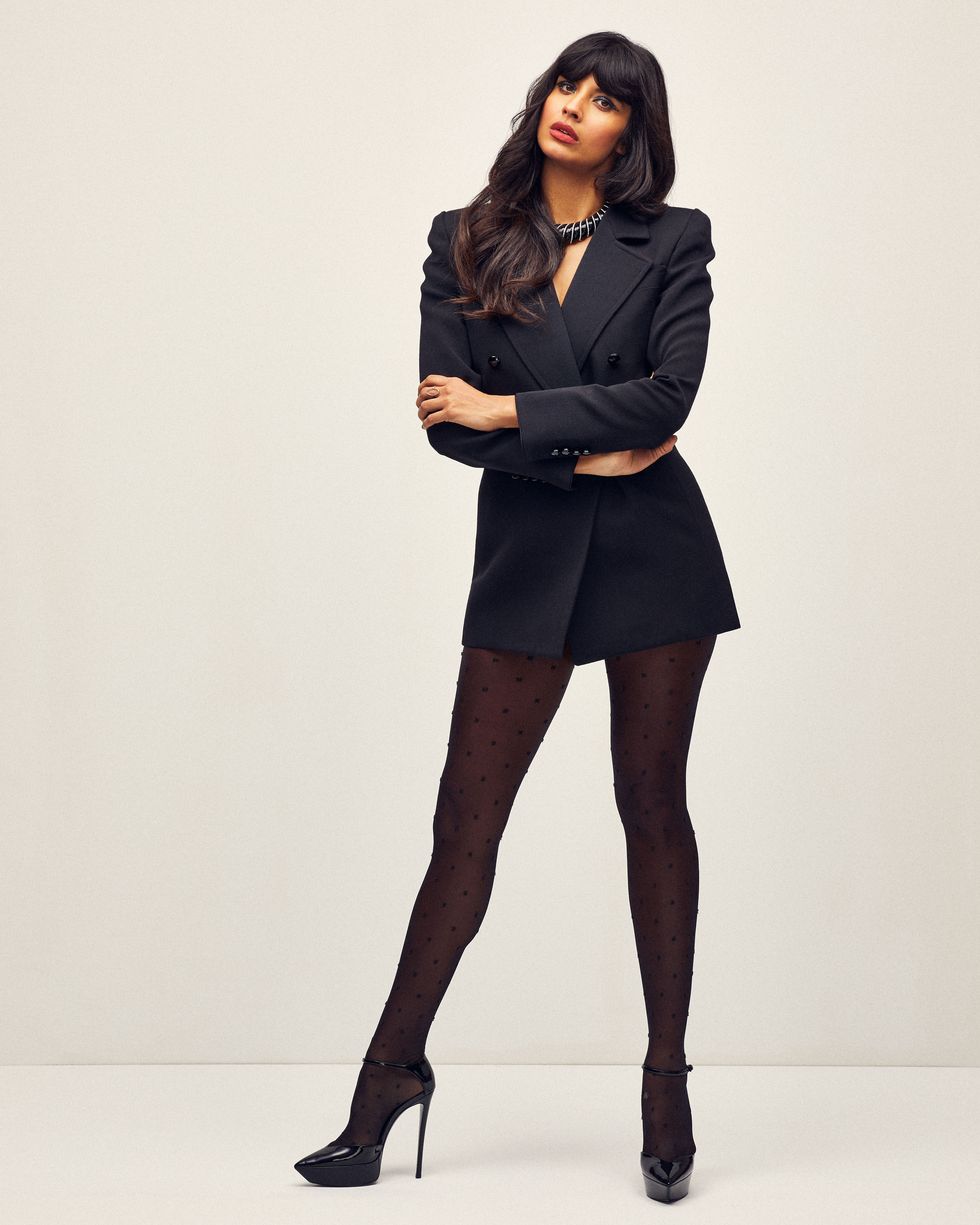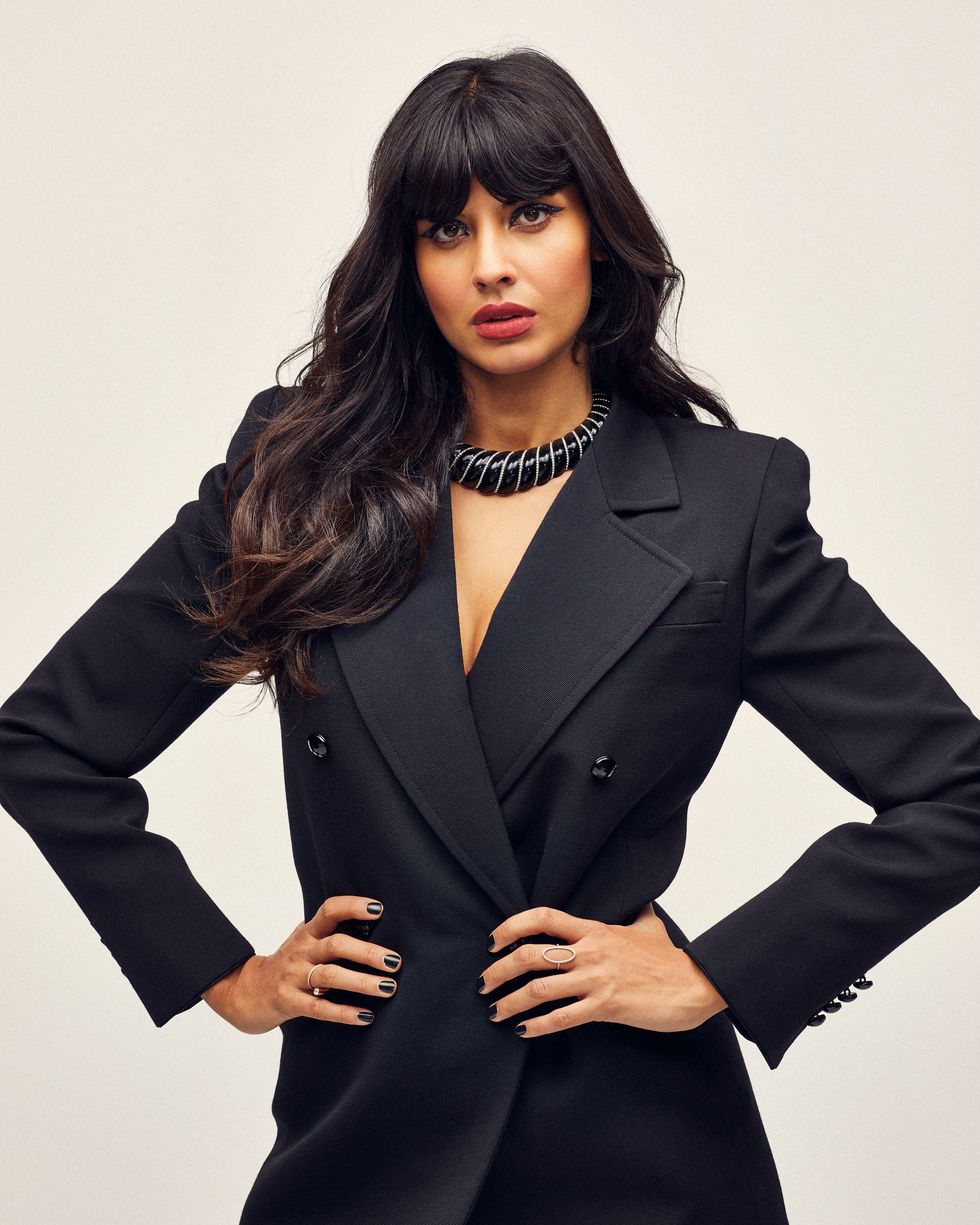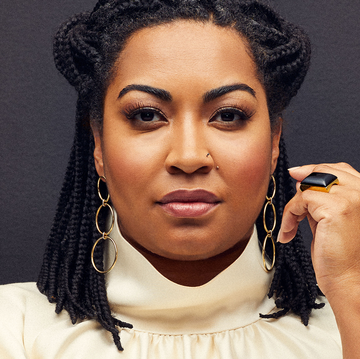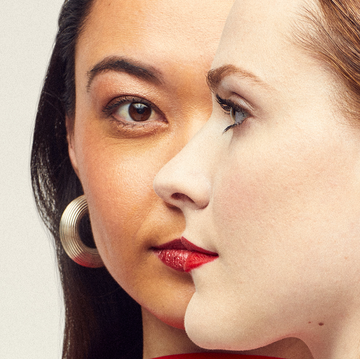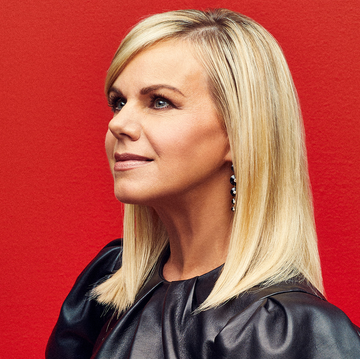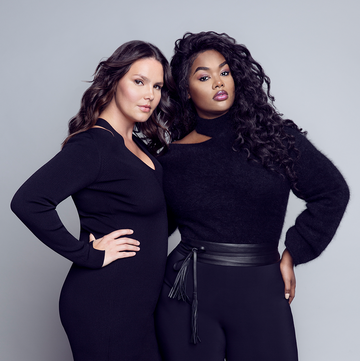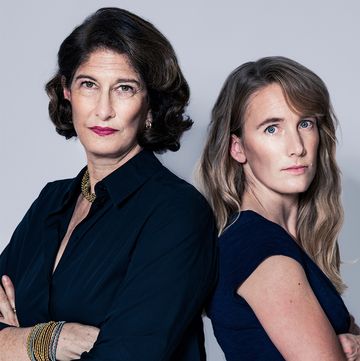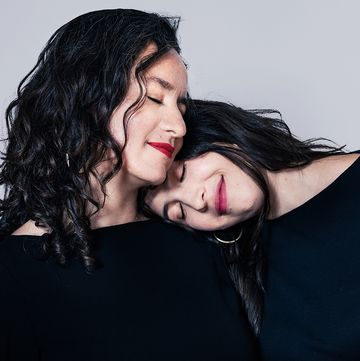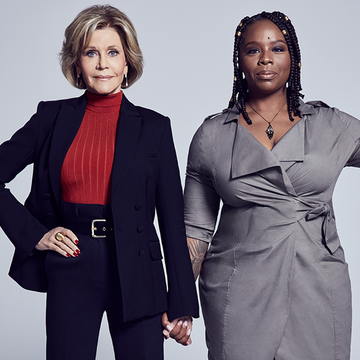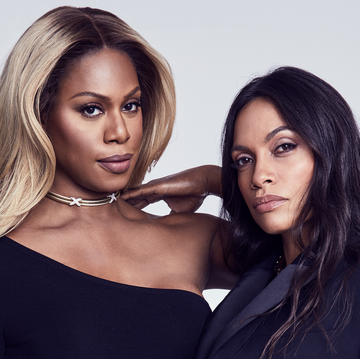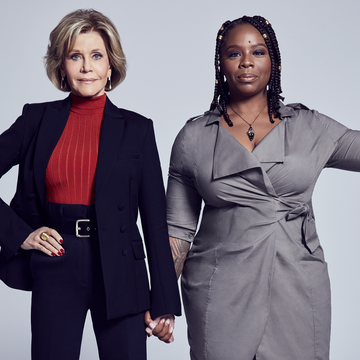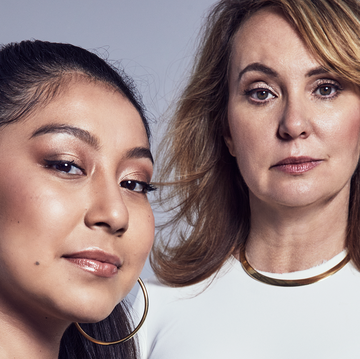For our 2019 Women Who Dare series, Jameela Jamil, the outspoken and always opinionated founder of I Weigh, asks Gloria Steinem, author of The Truth Will Set You Free, But First It Will Piss You Off, for advice on how to handle activism in the age of social media, how to talk to men about abortion and toxic masculinity, and whether the ideal feminist exists.
Jameela Jamil: I've been an activist for 14 years, but over the last two years, I've been very publicly embraced for it, and I don't think I had braced myself for what an intense experience it is when it comes to people's opinions about your opinion. A lot of the backlash I sometimes get is from men.
Gloria Steinem: Does that happen to you online or in person or both?
Jameela: It only happens to me online. I'm 5-foot-11, so normally men tend to be quite physically respectful towards me [laughs]. I'm very outspoken about the fact that I, similarly to you, feel very passionately about a woman's right to choose. I'm someone who's had an abortion, and I feel like I need to make sure that we prove it's not always just emergencies. People have abortions, sometimes a woman just wants her liberty, and we have to normalize that it's okay just to make that choice for yourself, because your life is as important as a newborn life that doesn't even exist yet.
Gloria: I utterly agree, and actually, as maybe you already know, going to a very early speak-out about abortion was what made me realize that we needed a women's movement. It took me a while to understand that the first step in every authoritarian regime is controlling reproduction, and that means controlling us. Unless we—men and women—have power over our own bodies and voices, there is no such thing as democracy.
In addition to being a profound personal issue of freewill and health, it's also the most basic political issue, because every authoritarian regime that I have ever read about, including Hitler's rise to power, every regime starts with controlling reproduction and that means controlling women's bodies.
Jameela: It's because it's the one thing that men cannot do that we can do.
Gloria: Yes, we have wombs, which obviously is the one thing men don't have. I think people have not yet, or at least in public dialogue, have not yet connected it to authoritarian regimes altogether. Whether it is in Germany or in the United States or in Brazil or India or China.
Jameela: I was wondering, as someone who's had such an intense journey throughout feminism, how you feel about where we are today in this conversation. Do you feel reassured? Do you feel worried? Do you see infighting that you find concerning? I would love to know your take on that.
Gloria: That's a big question, but I think that having been around for a long time gives me hope, because I remember when it was so much worse. The difference now is that the support for feminism and environmentalism, and antiracism and the trans movement, it's now, in this country at least, the majority movement. That is a huge step forward, because we used to be 30 percent, struggling. Now it's part of the national dialogue, and the majority of Americans agree, but that very fact means that we have a backlash from the third of the country that believes in the old hierarchies. Just because we have the majority doesn't mean that we will win, but it is very different from the past.
Jameela: Where do you feel like we have yet to move within feminism? What are things you feel like we, those of us who are now working within this space and working within social media, which has only really just risen in the last decade, need to utilize to further the women's movement?
Gloria: Well, I would say I think of two things. One, we need to remember that social media is a gift of information and connection, especially perhaps for women, because we can acquire those things in safety. But it is impossible to empathize with each other on a screen. We need to spend as much time physically together with other human beings as looking at a screen. I think we haven't learned that completely, and younger people especially may spend more time looking at a screen than being with other human beings. We don't manufacture oxytocin when we're looking at a page or a screen. So I think we need to learn that.
Jameela: Just willing to come together and mobilize more?
Gloria: Well, just be physically together. There are all kinds of heightened statistics of depression and suicide because of isolation. It's not to say that technology is not a blessing, it is, but it needs to be balanced. We need to make connections. God may be in the details, but the goddess is in connection. We need to understand that there is no democracy if women don't control their own physical selves. We tend to make it a personal argument as we just did, but not a big global political argument or an environmental argument, because part of the reason for the environmental crisis is forcing women to have children they wouldn't otherwise choose to have.
Jameela: I wonder, as someone who has met resistance in your early days of activism and it took a while, and correct me if I'm wrong, but it took a while to find your community. From what I understand, you found your community amongst women of color, and they are traditionally still quite left out of feminism. How can we do better to include women of color in this mainstream conversation?
Gloria: I would just put it differently. I think we need to be included, because actually, women of color have been way, way, way more likely to be feminist than white women, so it's the other way around. For instance, when we first started Ms. magazine in 1972, a long time ago, there was a Louis Harris national poll to measure women's opinions about the feminist movement and feminist issues. I think 63 percent of black women supported the women's movement and the issues, and only about 51 percent of white women; so it has always been the other way around. But it's been the limitations of the coverage of the movement and who is called a feminist by the media and sometimes by ourselves. Here's how I got educated in this: At the beginning, when I, as a writer, could not find places that were willing to publish feminist articles but I was getting invitations to speak in public, I asked friends to speak with me. Dorothy Pitman and then Florynce Kennedy, and a couple of others. Because Dorothy is a black woman, Florynce Kennedy is a black woman, I realized that the press would ask us—when we appeared as speakers—they would ask me about the women's movement and Dorothy or Flo or Margaret about the civil rights movement.
We would let it go on for a while and then say, "Wait a minute, Flo Kennedy is older than I as a lawyer, a far more experienced feminist than I am." But it was definitional. The reporters just assumed that I was talking about the women's movement and my partner was talking about civil rights movement. I say that to say it's never been true. Black women statistically have always been much more likely to be feminists and to have been part of giving birth to the feminist movement than white women. You can see it in the last election, where 94 percent of black women voted for Hillary Clinton and 53 percent of white women voted for Trump … for obvious reasons because white women are more likely to be dependent on the income and identity of white men, and therefore to vote their interest.
Jameela: How do we get to a place where we are more inclusive when it comes to the mainstream movement of feminism? What is it that needs to be explained to those who leave them out?
Gloria: They're already there. We need to join them. I don't mean to generalize, because every situation is somewhat different, but in the overall sense, we don't have the power to include them. We should have the wisdom to ask to be included, to go where they are.
Jameela: Something that I feel, as a woman of color, is that I wish more women who fight and advocate for feminism would also fight and advocate for the rights of women of color.
Gloria: If they are not doing that, they are not feminist. Either you're talking about all women, or you're not a feminist. Also, to return to the subject of reproduction, a major reason that patriarchal systems control reproduction is to perpetuate visible racial difference in racist society or caste, as in India. Thus, racism is factored in that.
Jameela: Could you expand on that?
Gloria: Well, if you cannot control reproduction, then people fall in love and marry each other, and the visible lines of difference among and between races begins to disappear. The caste lines in India began to disappear, so sexism and racism are intertwined and they cannot be uprooted separately.
Jameela: The argument I saw you make recently is that there's a fear that not enough white women are being born. That there's a need to control abortion to make sure that more and more white women are born.
Gloria: The white nationalists in this country make that very clear, and some of it is religious. For instance, the white evangelicals are supporting Trump solely on the issue of abortion. Obviously, it has nothing to do with his lifestyle. It has to do with their racism.
Jameela: There are many, many theories, a lot which I support, that there's an added insidious layer here, where they are also choosing areas where you have a lot of African-Americans, and where they are controlling abortion and being able to take that away from those women knowing that those women perhaps financially don't have the same kind of privilege as others. So if they are forced into pregnancy, especially when they're young, it's going to continue to further disenfranchise and marginalize them, because then they themselves find it harder, as single mothers or young mothers, to be able to succeed in their careers or in their lives. It's this extra way of creating a structure of poverty amongst an already marginalized community.
Gloria: Yes, and it is also even more basic than that, which is cheap labor. When there is a need for cheap labor, the ways for women of color to control their own reproductive lives are restricted. When there is no more need, then for instance, historically in this country, welfare payments were made dependent on sterilization. It is about, exactly as you say, it's not only the conditions of living, it's the need for workers or a lack of need for workers. Fannie Lou Hamer was a great proof of this, the great civil rights movement heroine Fannie Lou Hamer. Her mother had had a large number of children, often by rape, by the plantation owner. She herself had been sterilized without her knowledge in the Mississippi hospital when she went in for a different procedure. The difference between those two facts was the farm equipment. The need for labor had been diminished by farm equipment.
Jameela: Oh, my God.
Gloria: I know.
Jameela: I don't know the details of that. That's incredibly distressing. I guess in this moment of mass consumerism, that's why that need for more cheap labor is on the rise. I wonder what will happen if artificial intelligence progresses, how these roles will change again.
Gloria: Now, I don't know. The basic facts and the truth is that it is not up to anyone else to decide. It's up to the individual woman.
Jameela: Exactly. Throughout reading your works, as I've grown up and grown into learning more and more, I realize we're coming into this era where feminism is no longer … even 10 years ago, being feminist was considered some sort of a dirty word. Now it's become a marketing tool. It's so popular that it's something that people use in order to promote their brands, and that's such an intense flip to have occurred in just a decade. Now, it's something men feel comfortable talking about and advocating for. Where do we go when it comes to engaging men? We know if we look back through history, unfortunately, the oppressed have always relied at the end, after their fight, upon the final mercy of the oppressor in order to reach liberty.
Gloria: We chose the word feminist rather than women's liberationists, which was where we started, because it included men. If you look in the dictionary, a feminist is anyone who believes in the total social, economic, political equality of males and females, so of course men can and should be feminists too. It just means that we are getting rid of the gender roles that didn't always exist. Old languages didn't have he and she. They didn't have gender pronouns; people were people. The concepts of gender and race in human history seem to be relatively new and are being challenged in all kinds of ways, especially the transgender movement is challenging them. The point is to be inclusive and certainly men, for instance, have more years of life to gain. We looked at all the causes of death for men—heart disease, accidents, violence, all of them—and figured out that the masculine role was costing men about five years of life. If they were feminists, they would live five years longer. That seems like a great offer [laughs].
Jameela: Toxic masculinity [laughs].
Gloria: Yes, exactly. It's toxic to them, as well as to others.
Jameela: Unnecessarily toxic.
Gloria: I rarely speak to audiences that are mostly men but when I do, I always ask, "Who else can offer you five more years of life?" In terms of getting there, I think we understand that for women to be full human beings, we need to be equal outside the home, as well as in it. We understand less well that for men to be equal human beings, they have to be equal inside the home, as well as out. The long-term path to full humanity for men is raising children as much as women do, or being raised to raise children. The qualities you need to raise children—patience, attention to detail, empathy—that are wrongly called feminine, are actually human.
Jameela: I sometimes receive criticism in my feminism from other women in the fact that I try to empathize while still holding men accountable. I try to speak from a place of empathy towards the toxic environment that men have been marinating in almost from birth; similarly to us but in a very different way, with a different narrative. I try my best to include men in this conversation and to be kind whenever I can, but some people say that I'm pandering and that it's on them to do the work themselves and they should go and read and Google to try and understand. It is exhausting to take on the extra labor of that, and this is something that I end up in friction with a lot of feminists over. I believe that while I understand that emotional labor is exhausting, it is the only path to evolution for us, because it's going to take an extra effort to help them unlearn thousands of years of rhetoric.
Gloria: Yes, I agree. We can't darn their socks and also make the revolution. [Laughs.] We need to be inclusive, as we ourselves would want to be included where there were false divisions.
Jameela: Yes. I don't understand the argument of just leaving them to it—if that was going to happen, it would have happened by now. I do think that certain elements of it has to be explained and broken down, because, thanks to the Internet, there's such a wealth of misinformation out there. It is something I choose to spend a lot of my time doing, trying to invite them into this conversation and show them as well the economic benefit of feminism. We look across the globe and see that the most impoverished or disenfranchised countries are almost always the countries that oppress women the most, so therefore they have half a workforce. They are competing economically with countries that allow women into that workforce, perhaps still not equally, but they still contribute to our GDP. So it's so interesting to me how even at the cost of your general population and its living circumstances, you will still oppress women. You still don't see the value in just including women to take a bit of the weight off of you.
Gloria: I think the circle is the most invulnerable configuration. The strongest configuration hierarchy is the weakest, and so to have a circular society in which people are linked rather than ranked, is much more powerful than to have one that's hierarchical, and if you knock off the leader, then you've crippled the society.
Jameela: We live in a pursuit of moral purity nowadays when it comes to activism. I'm sure you must have come across it where suddenly it's become quite an unforgiving space, because people have waited so long for equal rights that they have lost their patience. And if you make a single mistake, you are damned and cast off and cast out of the movement. I think that's made some people a little bit afraid to engage in activism.
Gloria: I just would like to say to you that no one has the power to get you or anyone else out of the movement. The movement is the free will of individuals.
Jameela: Of course. I believe that confirmation doesn't exist for me personally, but there are some people who feel a bit more intimidated than that. Some people don't feel as sturdy as perhaps you do or I do, with the fact that human beings have the right to make mistakes and that we can continue to learn and grow and evolve and rise again. Not everyone feels as encouraged by that, and people, because of the fragility of their egos perhaps, they feel afraid to step into feminism or activism or inter-sectionalism, because they're worried that they might make a mistake. Do you have any advice for anyone who may be reading this interview right now, who wants to start to engage in activism but fears that they do not yet have all of the information?
Gloria: Well, I would say turn off the Internet and remember that action with all five senses is what makes a difference. Pressing send may make no difference at all. Do not allow yourself to be censored by anonymous voices on-screen. Do address the injustice you see in front of you.
Jameela: I'm an activist both physically in person, and I also utilize the Internet as a tool, and therefore, I come across a lot of backlash if I ever make any simple innocent mistake. I always see that as just an opportunity to learn. And I think that's something that perhaps we could spread further as a rhetoric in our society—that there's value in the humility of being willing to accept you don't have all the answers and that, of course, there are more ways you could evolve.
Gloria: Well, of course, I would not say that it is very socially useful to spend a whole lot of time on the web criticizing other people. I would just say leave them where they are and act in the world as it really is.
Jameela: I still see that same level of judgmental behavior happen face-to-face and in person.
Gloria: Does a face-to-face example come to mind?
Jameela: Many times. I've been in a room where a woman has said something, perhaps on a microphone in front of a lot of other women, and she expressed an opinion that wasn't fully formed yet. She's making a suggestion that other people find problematic, and rather than just questioning where the birth of her opinion comes from, or trying to invite her to see another side of things, the way that people pile on and disregard that person, and the judgment that pours out onto that person, then puts up that person's defense, and then makes them less likely to be able to hear the reasoning. It's something that I definitely witness, especially amongst the new generation who, unfortunately, are growing up on the Internet and are learning from the Internet, and then taking back into their personal space … especially because unlike us, they were raised on it.
Gloria: It is a truism that a group that has been kept comparatively powerless, then is more afraid to criticize the powerful and so often criticize each other. In the black community, it's called the crabs in the basket syndrome, when one crab starts off to climb out of the basket, others pull it down. In New Zealand, it's called the tall poppy syndrome. We need to be aware of that: Are people putting more energy into creating a hierarchy in the movement than in doing away with the hierarchy in the world?
Jameela: Sometimes I wonder if it's because not only are they intimidated by the oppressor, but also they have a certainty that the oppressor isn't listening and doesn't care. Therefore, you want to tell someone who cares, and therefore, all of your emotions pour out and pile onto that person, just because you know that they're actually listening.
Gloria: Well, that's true, but why be negative? I mean, if you joined their voices, you're more likely to be heard by the bad guy who needs to hear them.
Jameela: I agree. I very rarely will have a go at another woman, unless I feel like she's doing something as what I call "a double agent" for the patriarchies, which is when a woman is unintentionally spreading rhetoric of a patriarchy and it's being digested by other women because they trust this person, because she looks like them, and so therefore, they identify with her. I'm definitely someone who prefers to gather people in a group and go against an oppressive system or construct. Sometimes I call other women out, and when I do, I get called a bad feminist. How do you feel about the moment in which we call out one another's problematic behavior?
Gloria: I think that the point is to describe the act that is negative, not the person. To say why this specific act is likely to have a negative outcome is important without labeling the person who did the act.
Jameela: That's definitely something that I could get back to. I called a very prominent woman, Kim Kardashian, a toxic influence on young women, and then went on to describe why, so I could have perhaps made that less personal, but I needed to … there was such an influx of terrible rhetoric that was pouring from her giant platform out to young intellectual people.
Gloria: That's a very interesting example. I, too, am subject to the media image of the Kardashians. I have not met any one of them, so I am not an authority. I would just ask, what are they doing that's positive? Wearing clothes is way more conformist than revolutionary, so what in addition are they doing? I have no idea.
Jameela: Well, actually, in the last year, we've seen Kim work more and more publicly towards helping people within the prison system.
Gloria: Yes, I saw that.
Jameela: She's trying to work within prison reform, which is really important, and I champion those things. It's brilliant! I'm just always pushing for progress and not perfection. When I've called out the things that the Kardashian family do that I find highly problematic and, as I said earlier, furthering the patriarchal rhetoric and narrative, I call it out, and then I get criticized for criticizing another woman. I'm told I'm tearing another woman down. I feel that that accusation is leveled at anyone who's calling out the problematic behavior of another woman.
Gloria: Yes, it's not about biology, it's not about form, it's about content. Obviously, female human beings can do destructive things, and you're absolutely right, but I have no idea of what is the content there. I think you create your own prison if you create one that is nothing but visibility and nothing but selling products. At least at the very best, it's boring and it's the worst. [Laughs.]
Jameela: [Laughs.] I think for me personally, when other women criticize me, even if women are criticizing me for criticizing another woman, I take it as a good sign that I'm not being patronized. I see criticism that is constructive as the path to evolution. It's so funny, no one ever criticizes men who criticize Donald Trump and say, "You are anti-male, because you have criticized another man." It only exists on the female side.
Gloria: I would say that's the perfect response, for you to say that. That's wonderful.
Jameela: I'm glad. It's a relief to hear a feminist that I admire so much, to hear your take on that, and to know that I'm not actually evil if I question women. I feel like that's almost a way of muzzling us.
Gloria: It's quite useful to try to include in our own exchanges, "Tell me what I could've done better?" It's helpful.
Jameela: I appreciate this conversation so much. I've been so moved by your work my whole life, and I have to say that it's been a massive part of my journey through feminism, to learn from you and to watch your own personal journey. It's been a shining light for me and a lot of the people who are my peers.
Gloria: What you have just said to me is the great reward. It's way better than money. To know that you have made a difference in the world for another human being is the greatest reward, and you'll receive that reward. You are making a difference. You are passing it on, and that's what the movement is.
Jameela: Absolutely, I appreciate that, and I have a lot of people like you to thank for that. It's been wonderful to also watch someone who's come up against a lot. You've come up against your own hurdles, people trying to obstruct you, obstruct your path, and the words that you've been trying to get out to the world. To watch you continue to navigate around that and just keep going has been a source of strength for me, to keep going in those moments where I feel like I'm being purposely derailed, or silenced, because of the way that I look. Or because of the privilege that I might have. There's this problem that I find sometimes. And this is the last thing that I'll say, that sometimes we silence the marginalized and we blame them for their circumstances, but then we silence the privileged when the privileged try to speak out for the marginalized, saying that they are privileged to speak out.
Gloria: I agree. This is not a but, it's an and. And one of the solutions is to do it together. Whenever possible, we just make sure that the feminist group we are part of looks like the country we are in. The more powerful person is not speaking for the less powerful one, but making it possible for the less powerful one to speak. It's just trying to remember that the means are the ends. The means we use are most effective when they reflect the ends we are trying to achieve.
Executive Editorial Director: Joyann King | Photography: Allie Holloway | Chief Visual Content Director: Alix Campbell | Senior Visual Editor: Lauren Brown | Styling: Cassie Anderson | Stylist Assistant: Danielle Flum | Design Director: Perri Tomkiewicz | Designer: Ingrid Frahm | Digital Tech: Tim Mulcare | Photo Assistants: Matt Lamourt & Angela Cholmondeley | Director of Photography: Michael Sassano | Video Editor/Colorist: Erica Dillman | Hair: Nicole Blais for Exclusive Artists for Leonor Greyl Paris | Special Thanks to ROOT Studios

Olivia Fleming is the former Features Director at HarpersBAZAAR.com. Born in New Zealand, Olivia was raised with two basic beliefs: That deep respect for the earth is a given, and women are imperative to leading a successful, progressive country (two female prime ministers took office during her childhood). But after moving to New York in 2008, she quickly realized that her status quo was at odds with the rest of the world. In an effort to change that—and to legitimize women's duel interest in fashion, politics, and human rights—Olivia focuses on female storytelling. From long-form features and ambitious packages, to new podcast initiatives that elevate the magazine's content mix across platforms, she champions the stories no-one else is telling.


